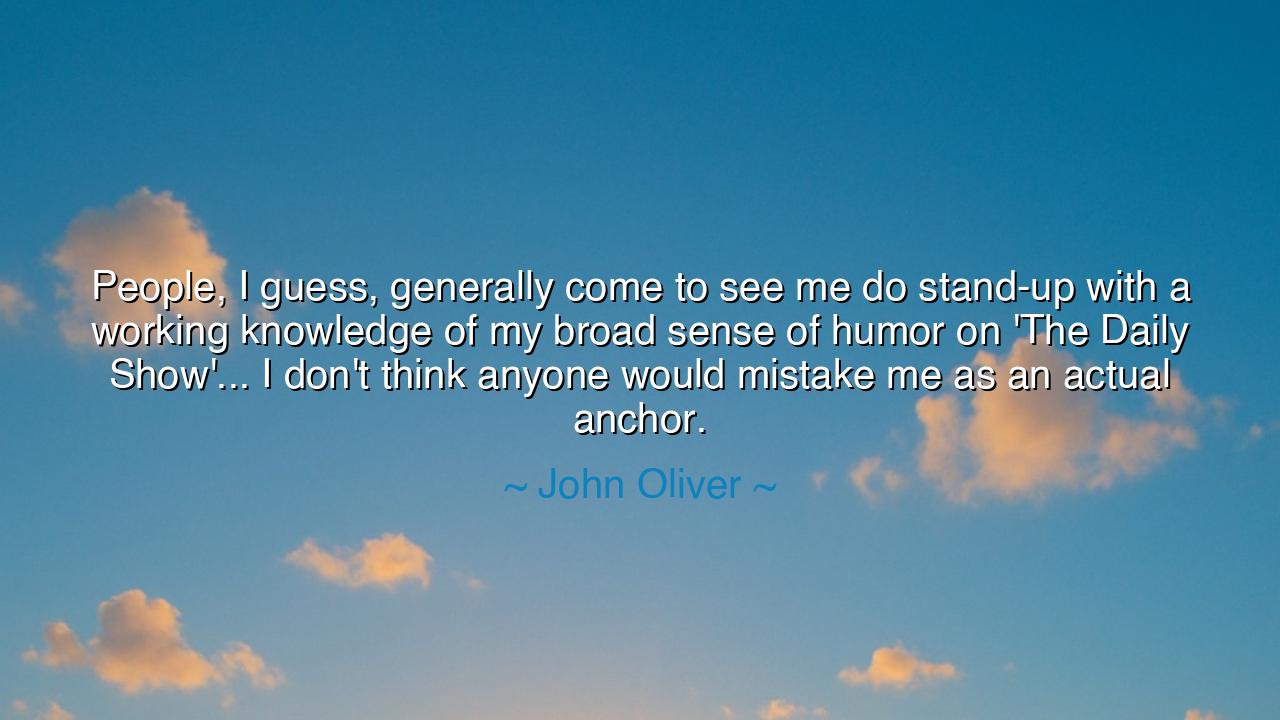
People, I guess, generally come to see me do stand-up with a
People, I guess, generally come to see me do stand-up with a working knowledge of my broad sense of humor on 'The Daily Show'... I don't think anyone would mistake me as an actual anchor.






In the words of John Oliver, “People, I guess, generally come to see me do stand-up with a working knowledge of my broad sense of humor on ‘The Daily Show’… I don’t think anyone would mistake me as an actual anchor.” Beneath this lighthearted remark lies a profound meditation on truth, perception, and authenticity. For Oliver, a man of wit and satire, knows that laughter can illuminate truth more powerfully than solemn speech. Yet he also understands the delicate boundary between the jester and the judge, between one who mocks the world and one who proclaims its laws. In acknowledging that he is no “anchor,” he reminds us that the truest wisdom often comes not from authority, but from humility, from knowing one’s place in the great dance of roles that make up society.
The ancient storytellers knew this truth well. In the courts of kings stood the fool, the one permitted to speak truth under the mask of comedy. His tongue was sharp, yet his heart was gentle, for he sought not to destroy but to awaken. The jester was not mistaken for a ruler, nor did he wish to be. His power was of a subtler kind — to reveal hypocrisy with laughter, to pierce arrogance with jest. So too does John Oliver carry this mantle in modern form. His “broad sense of humor” is not foolishness, but the noble art of turning the mirror toward the world and inviting it to laugh at its own reflection.
To be an anchor is to bear the weight of authority — to announce, to define, to hold fast amid the tides of confusion. But the comedian sails freer waters. He may drift into the absurd, yet in doing so, he discovers the hidden currents of truth that the serious often overlook. When Oliver says he is no anchor, he declares his freedom from the chains of pretense. He refuses the heavy mantle of false gravitas. His stage, like the Agora of the ancients, is a place of conversation and revelation — where laughter becomes philosophy, and mockery becomes insight.
Think of Diogenes of Sinope, the philosopher who lived in a barrel and mocked the grand philosophers of Athens. When Alexander the Great, conqueror of nations, stood before him and asked what gift he might bestow, Diogenes merely said, “Stand out of my sunlight.” The crowd laughed, but beneath the laughter was admiration — for in that jest lay defiance, wisdom, and truth. Like Diogenes, John Oliver’s humor challenges power by refusing its illusions. He stands not as a voice of command, but as a voice of conscience, reminding us that laughter can be rebellion, that irony can be armor, and that humility can be mightier than status.
Yet there is gentleness in his words too — a recognition of audience and intent. Oliver knows that those who come to see him already understand his spirit, that they expect light amid the dark, wit amid the chaos. He does not need to masquerade as an authority, for his bond with them is built on honesty and shared laughter. This is a rare kind of leadership — not the leadership of decree, but of trust. The leader who leads through laughter commands not obedience, but understanding. He draws people not by claiming to be above them, but by showing that he stands among them.
In this way, humor becomes a bridge between the lofty and the lowly, between wisdom and folly. The ancient playwright Aristophanes wielded his comedy to challenge war and hypocrisy; Shakespeare’s fools spoke truths that nobles dared not utter; and in our age, comedians like Oliver carry on this sacred lineage. Through laughter, they speak the unspoken, they unveil the absurd, and they heal the weary. True humor is not an escape from reality — it is the light by which we see it more clearly.
Let this then be the lesson: Know your role, but never underestimate its power. Whether you are anchor or fool, scholar or dreamer, serve your purpose with clarity and heart. Do not chase titles or authority, for wisdom shines brightest in those who do not seek the crown. Let your humor be honest, your speech grounded, your laughter compassionate. In a world heavy with false seriousness, the ability to laugh — and to make others laugh — is an act of courage and grace.
And so, dear listener, remember John Oliver’s humble truth: you need not be an anchor to bring stability, nor a prophet to reveal truth. Sometimes the greatest wisdom arrives clothed in laughter, and the deepest sincerity is born from jest. Laugh bravely, speak truthfully, and live lightly — for the soul that knows its purpose, and wears it with humility, will always stand firm amid the storms of the world.






AAdministratorAdministrator
Welcome, honored guests. Please leave a comment, we will respond soon